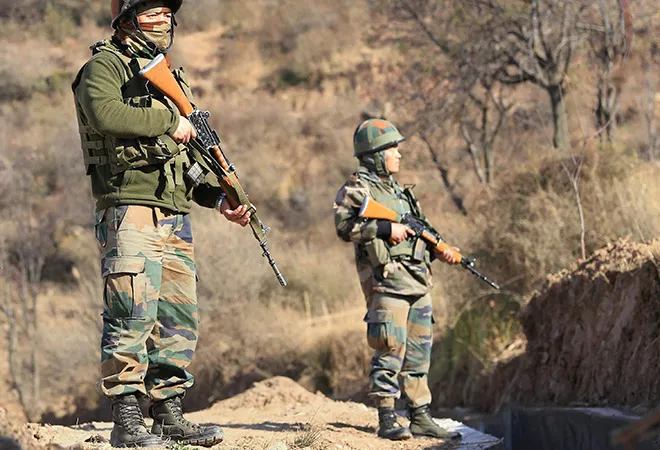-
CENTRES
Progammes & Centres
Location
The way it is currently configured, Pakistan is unlikely to to mend itself any time in the foreseeable future.

It is not always easy to provide commentary on an episode that is still unfolding. Besides, there is so much ‘knowledgeable’ (sic) chatter in the media, with ‘both sides’ playing mind games, that it is difficult to do a reasonably accurate timeline. It’s certainly far more difficult than a running cricket commentary, especially with the Pakistanis not playing a ‘gentleman’s game’.
They have not for the last 70 years, and they are not likely to in the foreseeable future.
It is beyond Pakistan to understand that following the punitive strike by Indian forces against ‘terrorist launch pads’ on September 29, 2016, and the attack on Jaish-e-Mohammed (JeM) terror camps in Pakistan and Pakistan-Occupied Kashmir (POK) on Wednesday, the entire game has changed. The shift is that each time there is a major terrorist strike now, there will be reprisals. The evolving situation will continue to have many variables and consequences.
The Indian Air Force (IAF) attack on JeM terror camps in Balakot, not far from where Osama bin Laden hid out in Abbottabad, was a magnificent professional operation that has most certainly embarrassed the military brass in Pakistan. The main enemy of Pakistan’s generals, and the raison d’être for their primacy in Pakistan, had flown past their defences, reportedly hit their safe havens for terrorists and returned to safety.
It is quite possible that the Indian security and intelligence establishments had begun planning such reprisals even before the terror attack in Uri last September. There would be other plans stored away surely. All such plans would have been fine-tuned, and the possible costs of the reaction factored in to the plans.
The Pakistani reaction of sending their air force into Jammu & Kashmir was, therefore, unlikely to have been a surprise in South Block. It is unfortunate that Wing Commander Abhinandan Varthaman found himself in Pakistani custody. And India should accept the announcement of Imran Khan of his release on Friday graciously.
We need not, however, lower our guard or rush into warm embraces. India’s media would do well to exercise some restraint and not pressure our government, as was done in the case of the IC-814 hijack in December 1999 that led to the unfortunate release of now JeM chief Masood Azhar among other terrorists.
Some Pakistani commentators have claimed that Prime Minister Imran Khan’s reaction to Narendra Modi’s angry and emotional speech was a calm, well-reasoned one, calling for restraint and peace. So was the reaction of the director general Inter-Services Public Relations - the Pakistani army’s mouthpiece - ‘of dignity and poise’.
Smug, one would add, considering that Pakistan is the only country that encourages terrorists to kill soldiers and civilians in all three of its neighbouring countries without reprisals. This has now changed.
India now has only hard options. The world may not isolate Pakistan completely. But, at least, we need not continue with ‘normal’ behaviour and exchanges. Downgrading of diplomatic ties is just the beginning. If Pakistan’s heart burns for Kashmiris, ours should similarly burn for the Baloch, Pashtun and Sindhis, and we should show this in various ways. We expect our armed forces and paramilitaries to protect us and die for us because ‘it is their job’.
We ourselves shirk from making the smallest sacrifice. We must begin by willingly accepting the severance of all kinds of people-to-people contact, including in the ‘apolitical’ fields of sports, films and the arts. Trade links and diplomatic ties must be kept in abeyance. We need to insist that the International Cricket Council (ICC) ban Pakistan from playing in the next World Cup - and we know we have the means to force this.
Our media’s hyper-nationalism can be embarrassing. They must realise that one battle victory does not translate into a victory in war. The other side can react too, as it did. A little mellowing would make statements more credible.
Second, the way it is currently configured, Pakistan is not likely to be able to mend itself any time in the foreseeable future. It is irrevocably Islamic whose goal is ‘Ghazwa-e-Hind’ (Battle of India). Neither for the Islamists nor for the army is Kashmir an issue. That is the excuse — the narrative for the people at home to keep them poor and divided while rulers have free rein. This suits China as it extends its reach in the Arabian Sea using a servile Pakistan and keeping India off balance. ..
Third, let us try to get our own house in order. The situation in J&K today is a result of the policy mistakes we have made ever since we halted our troops on the banks of the Kishanganga in 1948. The Opposition has been making every issue a ‘Modi vs Us’ one.
‘Pulwama’ has been politicised. Instead, Opposition leaders should pick up a thing or two from All India Majlis-e-Ittehadul Muslimeen (AIMIM) MP Asaduddin Owaisi’s speech in Mumbai on February 22 where he linked Pakistan — and not just the JeM — to Pulwama, and demanded the Pakistani establishment to drop its ‘mask of innocence’. He spoke for India.
This commentary originally appeared in The Economic Times.
The views expressed above belong to the author(s). ORF research and analyses now available on Telegram! Click here to access our curated content — blogs, longforms and interviews.

Vikram Sood is Advisor at Observer Research Foundation. Mr. Sood is the former head of the Research and Analysis Wing (R&AW) — India’s foreign intelligence agency. ...
Read More +